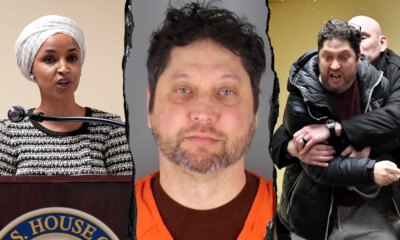Politics
During Watergate, the Supreme Court spoke with one voice. Can it do the same in Trump's case?
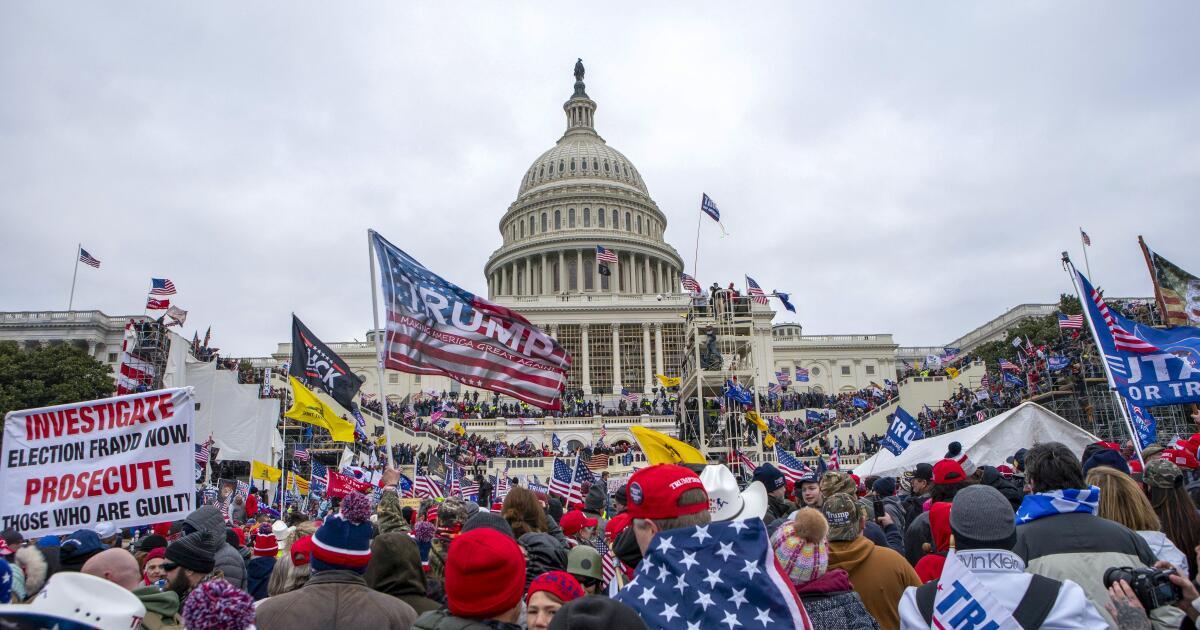
Fifty years ago this month, the U.S. Supreme Court was mulling a landmark case with profound implications for America’s democracy.
The question before justices in the Watergate tapes dispute was whether the president was above the law, shielded from prosecutors and a judge who were investigating a crime.
The court’s answer was clear, unflinching and unanimous.
A unanimous Supreme Court ruling helped resolve another constitutional crisis in 1974, when President Nixon claimed executive privilege over his White House tapes during the Watergate investigation.
(Associated Press)
The Constitution has no “absolute, unqualified presidential privilege of immunity,” the court said in July 1974 in United States vs. Nixon. The president’s claim of executive privilege for his White House tapes, justices said, “cannot prevail over the fundamental demands of … the fair administration of criminal justice.”
Chief Justice Warren Burger, an appointee of then-President Nixon, wrote the court’s opinion. The Watergate case marked a high point for an often divided and contentious court and helped bring together a nation that was in the grip of a constitutional crisis.
The same basic issue is before the court again in Trump vs. United States: Are presidents above the law, immune forever from criminal charges for their actions in the White House? Or can they be prosecuted and held to account for breaking the law?
The decision figures to rewrite the law on the powers of the president and a cast a lasting shadow on the Supreme Court led by Chief Justice John G. Roberts Jr.
Few are predicting the current court will rise to the occasion and deliver a clear, unanimous ruling.
The two sides of the debate drew a sharp contrast when the court heard arguments in late April.
“Without presidential immunity from criminal prosecution,” Trump’s attorney John Sauer told the court, “there can be no presidency as we know it.”
Justice Department veteran Michael Dreeben replied that presidential immunity had been rejected in the past and should be rejected now.
“All former presidents have known that they could be indicted and convicted. And Watergate cemented that understanding,” Dreeben said, arguing on behalf of special counsel Jack Smith.
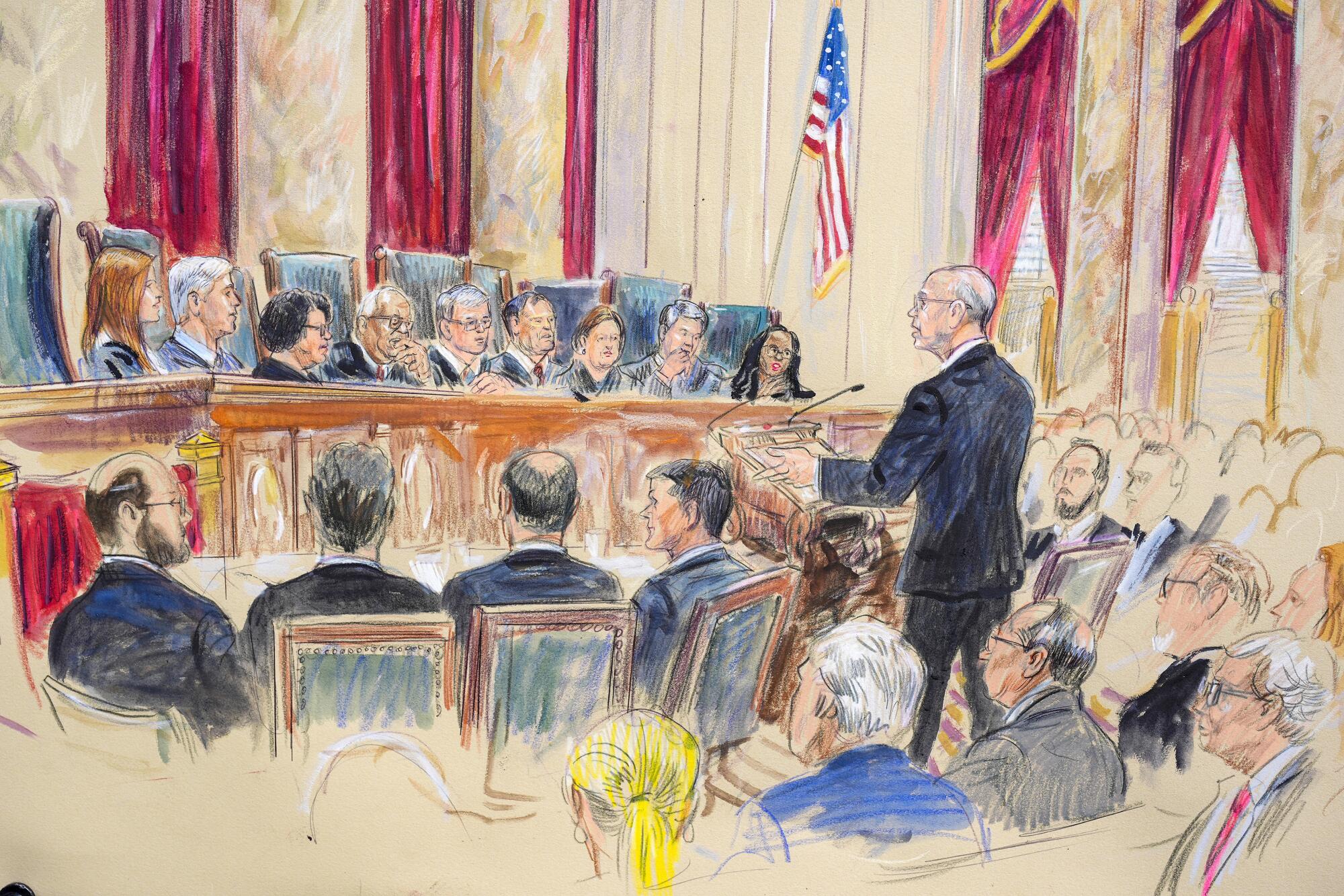
The Justice Department’s Michael Dreeben, speaking to justices on April 25 in this artist’s sketch, argued that “all former presidents have known that they could be indicted and convicted. And Watergate cemented that understanding.”
(Dana Verkouteren / Associated Press)
If the justices split along ideological lines, with the three liberals in dissent, the decision is sure to be condemned as partisan.
So the chief justice is likely to try to put together a majority that includes at least one liberal for what could be seen as a middle-ground position.
That would mean rejecting Trump’s claim of absolute immunity as well as Smith’s view that a former president has no shield from being prosecuted, even for truly official acts.
Trump was indicted last year on accusations of conspiring to overturn the results of the 2020 presidential election he’d lost to Joe Biden, including by making false claims of election fraud and encouraging thousands of his supporters to march to the Capitol on Jan. 6, 2021, when the House and Senate met to confirm Biden’s election.
Trump pleaded not guilty and insisted that his actions — taken while he was president — should be forever immune from prosecution.
Several Justices — some of whom have worked in Washington for decades — said during arguments in April that a president’s use of his “core executive powers” should be off-limits to future charges. They are wary of opening the door to politically driven criminal investigations.
Prior to Trump, no president had been indicted after leaving office, though at times charges were contemplated.
Could President Reagan have been prosecuted for the so-called Iran-Contra affair, a secret White House scheme to sell arms to Iran to support rebels in Nicaragua after Congress blocked their funding? Could President George H.W. Bush have been prosecuted for denying he knew about the scheme when he was vice president? While no such charges were brought, an independent counsel looked into those allegations.
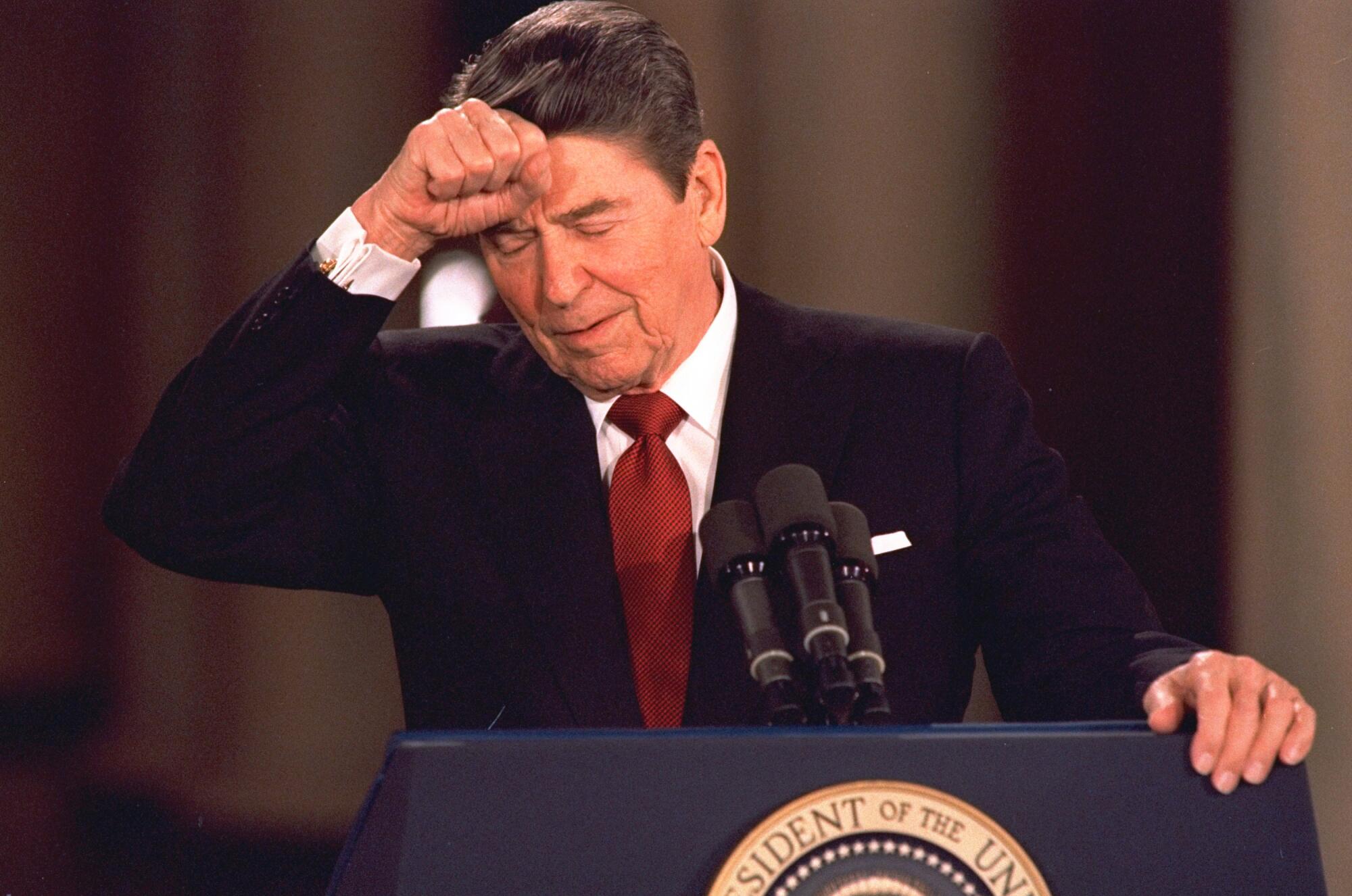
President Reagan, seen in 1987, and his vice president and successor, George H.W. Bush, were investigated for possible charges in the Iran-Contra scandal, but were not among the 13 people indicted.
(Dennis Cook / Associated Press)
President Clinton was also threatened with prosecution after leaving office for having lied to investigators about his relationship with a White House intern.
To take a more recent example, could former President George W. Bush have been investigated or prosecuted by a Democratic administration for his responsibility in the harsh treatment of detainees at Guantanamo Bay, Cuba, or over the alleged torture of prisoners at secret CIA sites in Europe?
The Obama administration did not pursue any such charges, but former White House lawyers, including now-Justice Brett M. Kavanaugh, voiced concern about subjecting presidents to criminal charges after they leave office.
A critical question in the Trump case is: What qualifies as an “official” act by a president, and what sort of actions are considered private, even potentially criminal?
Most of the justices appeared to agree during arguments in April that Trump had been indicted over a private scheme, not for the use of any core executive powers.
Justice Amy Coney Barrett, a Trump appointee, noted that the former president was accused of enlisting lawyers to submit “false claims of election fraud” and to send “fraudulent slates of presidential electors” to Congress.
“Sounds private,” she said.
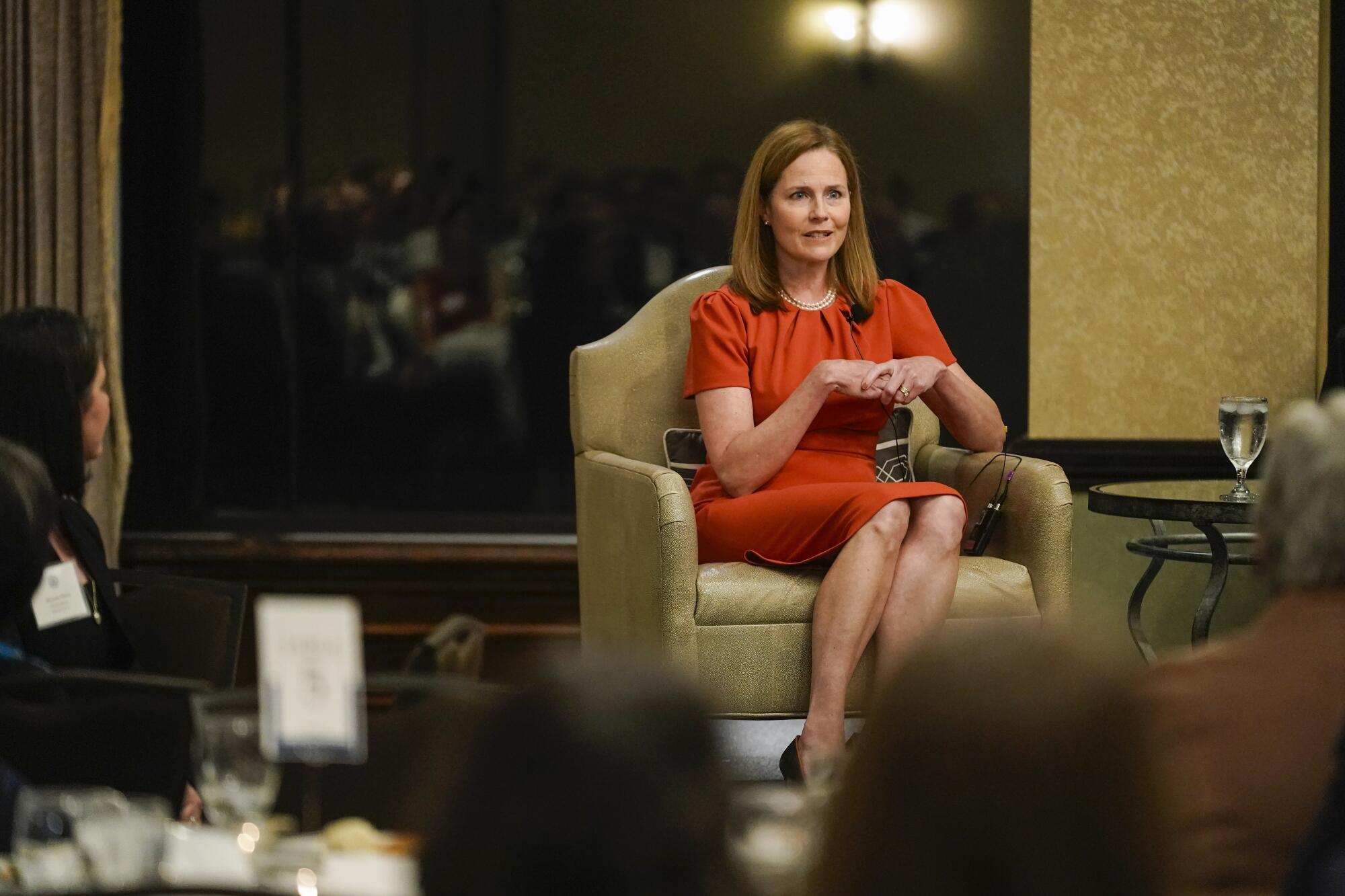
Trump appointee Amy Coney Barrett was among a majority of justices in April who seemed to agree that the former president had been indicted over a private scheme as a candidate, not for official presidential actions.
(Morry Gash / Associated Press)
Sauer, the Trump attorney, agreed.
“So you would not dispute those were private, and you wouldn’t raise a claim that they were official?,” Barrett asked.
Again, the lawyer agreed.
Later, when pressed by others, Sauer agreed with a lower court that had drawn a distinction between the conduct of an officeholder and that of a candidate for office. Prosecutors relied on that distinction, arguing that Trump was indicted for his actions as a failed candidate for reelection, not as an officeholder carrying out his official duties.
Barrett’s questions hinted at the possibility of a narrow ruling rejecting Trump’s claim of immunity from charges that he conspired to overturn his election defeat. The three liberal justices could agree with that.
But conservative Justices Samuel A. Alito Jr., Neil M. Gorsuch and Kavanaugh said they favored a broader shield for presidents when they use their official powers.
If that becomes the majority opinion, the court’s liberals may well refuse to go along. They voiced concern about shielding a president who abuses his power.
What if the president orders a “military coup?” Justice Elena Kagan asked during the arguments.
As commander in chief, if a president “told the generals: ‘I don’t feel like leaving office. I want to stage a coup,’” she asked, would that be an official act, shielded from future prosecution?
“It could well be,” Sauer replied.
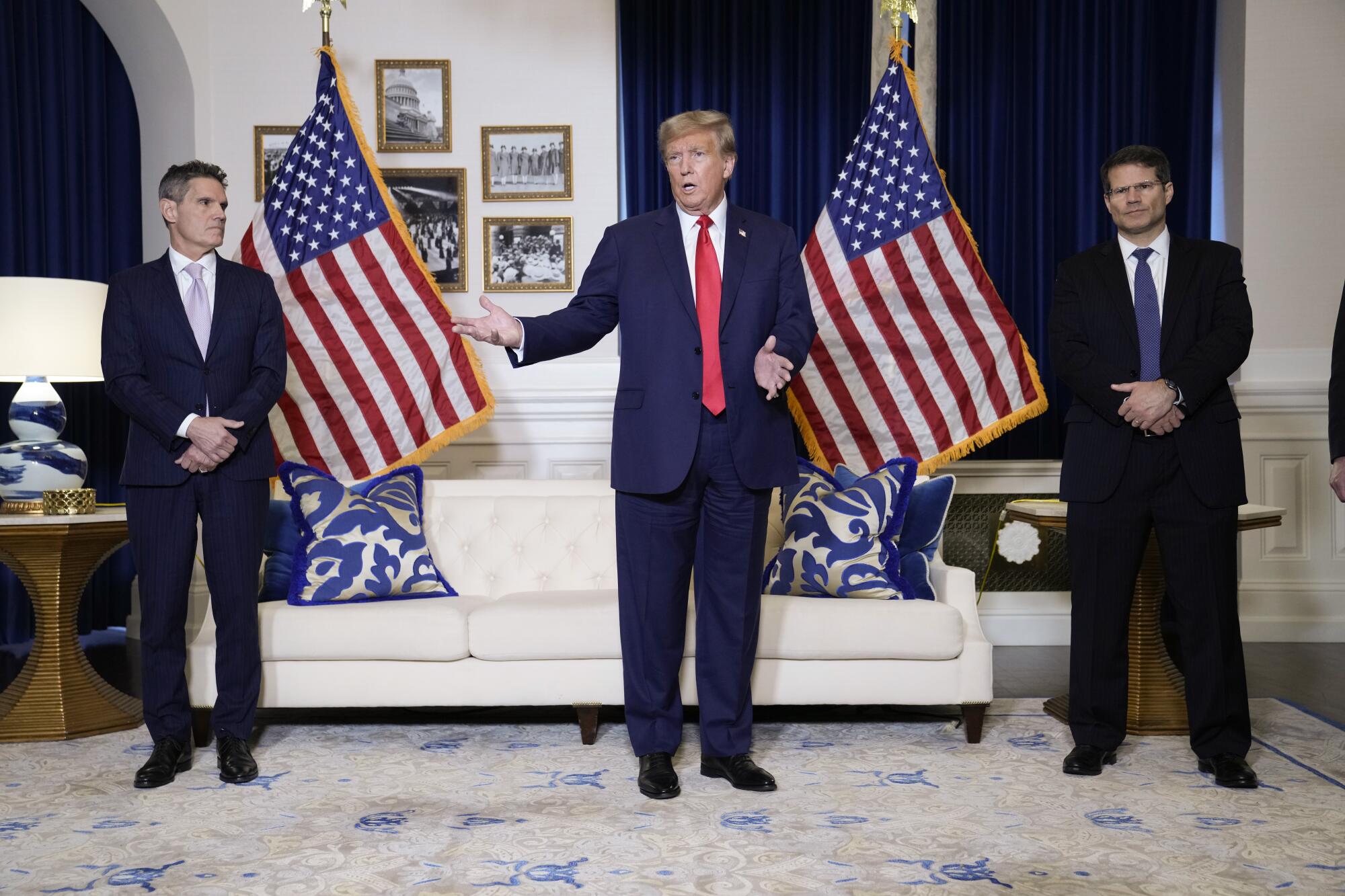
John Sauer, right, with the former president and fellow Trump lawyer John Lauro in January, said in April that a president “could well be” be shielded from prosecution for ordering a military coup to stay in office.
(Susan Walsh / Associated Press)
So the problem facing the chief justice is that an opinion supporting a president’s immunity for official acts could drive the three liberals to dissent, while some conservatives may balk and refuse to join a ruling if it only holds that an ex-president can be prosecuted.
Four years ago, Roberts had a solid 7-2 majority rule against a Trump claim of “absolute immunity” and order the then-president to turn over financial and tax records to New York prosecutors.
The chief justice said the presidential supremacy claimed by Trump had never been part of America’s history.
“In our judicial system, the public has a right to every man’s evidence. Since the earliest days of the republic, ‘every man’ has included the president of the United States,” Roberts wrote in Trump vs. Vance. Two conservative justices, Alito and Clarence Thomas, dissented.
Critics say the Roberts court has already delivered a victory of sorts for Trump by taking so long to decide on his immunity claim.
“This case goes to the heart of our democracy, and they’ve been slow-walking it,” said Fred Wertheimer, president of Democracy21 and a champion of campaign funding limits since the Watergate era. The court decided the Watergate case 16 days after the oral argument, he noted.
This year, by contrast, the justices have taken months to ponder a claim of immunity, a delay that has postponed Trump’s federal prosecutions and is almost certain to prevent a jury from deciding before the November election whether he conspired to overturn his defeat in the 2020 election.
“The court should never have taken this case,” Wertheimer said. “The voters were entitled to know whether Trump engaged in criminal conduct to overturn an election he lost.”
He’s not the only Watergate-era lawyer who is troubled. In 1974, Philip Lacovara, as counsel to the special prosecutor, urged the Supreme Court to reject Nixon’s claim of executive privilege with a “definitive” ruling. Nixon had hinted he may defy the decision if the justices were divided.
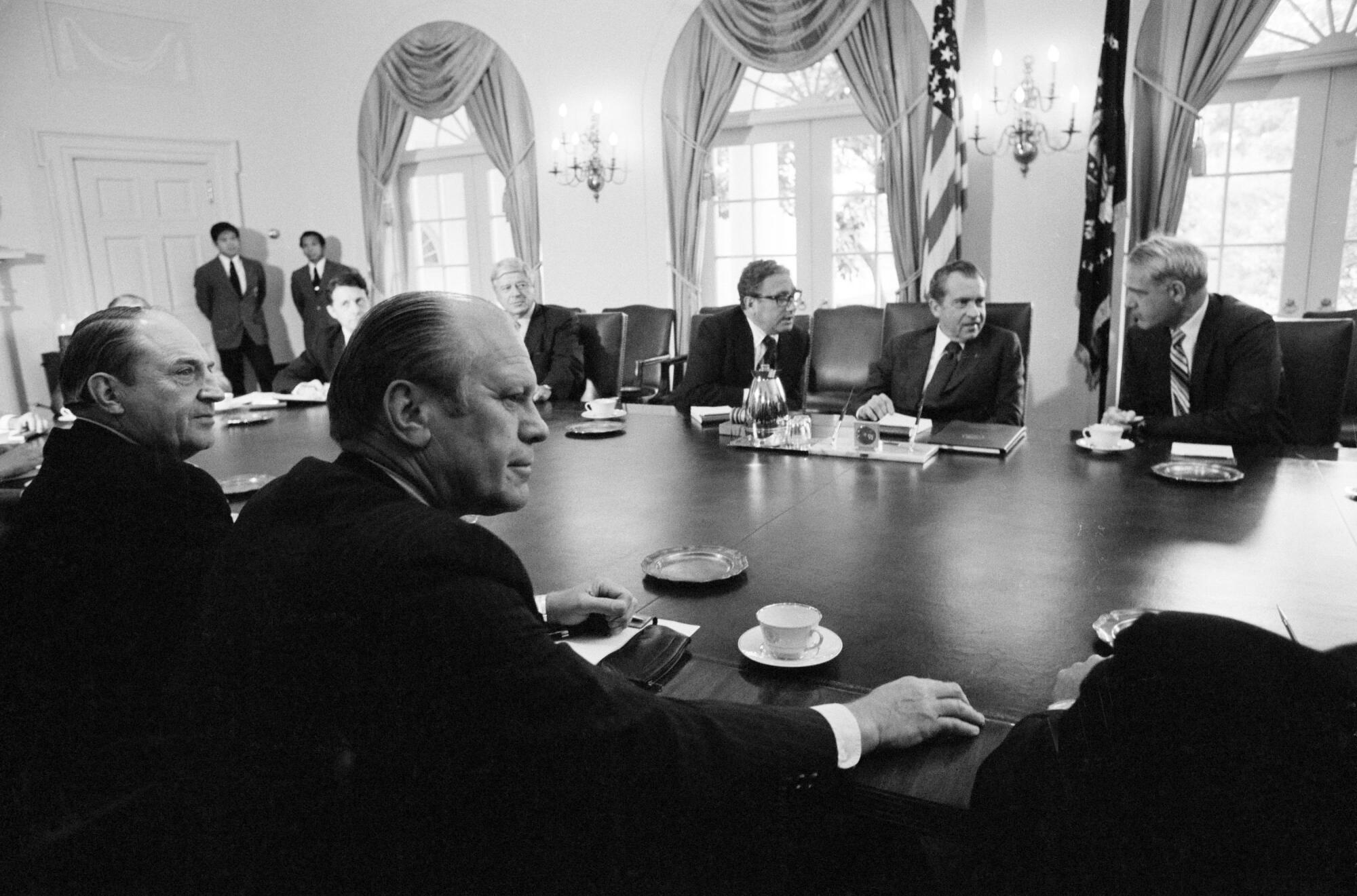
Vice President Gerald R. Ford, in the foreground at Nixon’s final Cabinet meeting before his August 1974 resignation, would go on to pardon his former boss ahead of his “possible indictment and trial for offenses against the United States.”
(David Hume Kennerly / Getty Images)
Just 16 days after the court ordered him to disclose the tapes, Nixon resigned. A month later, President Ford granted him a full pardon, after saying his predecessor was facing “possible indictment and trial for offenses against the United States.”
In a recent interview, Lacovara warned against making a former president immune from criminal prosecution, noting that history has shown that sometimes strong men with no moral compass can win election.
“That’s why this could be the most dangerous decision the court has ever made,” he said of Trump’s case. “Once you crack it open and say the president gets to violate some laws, there’s no way to constrain it. You have started down a very dangerous road.”

Politics
Mamdani’s response to Trump’s Iran strike sparks conservative backlash: ‘Rooting for the ayatollah’

NEWYou can now listen to Fox News articles!
New York City’s socialist Mayor Zohran Mamdani is facing blowback from conservatives on social media over his post condemning the U.S. attack on Iran that led to the killing of Iran’s supreme leader, Ayatollah Ali Khamenei.
On Saturday, as a joint strike on Iran by the United States and Israel was developing, Mamdani blasted the Trump administration’s decision in a post on X that has been viewed roughly 20 million times.
“Today’s military strikes on Iran — carried out by the United States and Israel — mark a catastrophic escalation in an illegal war of aggression,” Mamdani wrote.
“Bombing cities. Killing civilians. Opening a new theater of war. Americans do not want this. They do not want another war in pursuit of regime change.”
New York City Mayor Zohran Mamdani speaks to reporters during a news conference in New York Feb. 17, 2026. (AP Photo/Seth Wenig)
Mamdani said Americans prefer “relief from the affordability crisis” before speaking directly to Iranians in New York City.
“You are part of the fabric of this city — you are our neighbors, small business owners, students, artists, workers, and community leaders,” Mamdani said. “You will be safe here.”
The post was quickly slammed by conservatives on social media making the case that Mamdani’s response appeared sympathetic to Iran’s brutal regime and pointing to his lack of public reaction to the Iranian protesters killed in recent years.
“Comrade Mayor is rooting for the Ayatollah,” GOP Sen. Ted Cruz posted on X. “They can chant together.”
OBAMA OFFICIAL WHO BACKED IRAN DEAL SPARKS ONLINE OUTRAGE WITH REACTION TO TRUMP’S STRIKE: ‘SIT THIS ONE OUT’
“Do u say anything pro American ?” Fox News host Brian Kilmeade posted on X. “do u know any Iranians – ? they hate @fr_Khamenei they celebrate his death, you should be celebrating his death ! hes killed thousands of American’s and just killed 30k Iranians, did u even say a word about that? You are an embarrassment !! Please quit.”
Sen. Ted Cruz, R-Texas, questions Pam Bondi, President-elect Donald Trump’s nominee to be attorney general, during her Senate Judiciary Committee confirmation hearing in Hart building Jan. 15, 2025. (Tom Williams/CQ-Roll Call, Inc via Getty Images)
“I don’t feel safe in New York listening to someone like you, Mamdani, who sympathizes with the regime that killed more than 30,000 unarmed Iranians in less than 24 hours,” Iranian American journalist Masih Alinejad posted on X.
“We Iranians do not allow you to lecture us about war while you had nothing to say when the Islamic Republic shot schoolgirls and blinded more than 10,000 innocent people in the streets. You were busy celebrating the hijab while women of my beloved country Iran were jailed and raped by Islamic Security forces for removing it.
“And NOW you find your voice to defend the regime? No. I will not let you claim the moral high ground. The people of Iran want to be free. Where were you when they needed solidarity?”
CLICK HERE TO DOWNLOAD THE FOX NEWS APP
“How is it that you can’t differentiate between good and evil?” Billionaire hedge fund manager Bill Ackman posted on X. “Why is this so hard for you?”
“It takes a particular kind of audacity, or ignorance, for a city mayor to appoint himself the conscience of American foreign policy while his constituents step over garbage on their way to work,” GOP Rep. Nancy Mace posted on X. “History will not remember his bravery. It will not remember him at all.”
“Iranian New Yorkers are thrilled today and see right through you,” Republican New York City Councilwoman Vickie Paladino posted on X.
Bill Ackman, CEO of Pershing Square Capital Management LP, speaks during the WSJ D.Live global technology conference in Laguna Beach, Calif., Oct. 17, 2017. (Patrick Fallon/Bloomberg/Getty Images)
“When Kuwait, Saudi Arabia, Qatar, Turkey, UAE, Bahrain all support today’s operation eliminating world’s #1 sponsor of terror, but New York City’s Mayor @ZohranMamdani is shilling for Iran,” Republican New York City Councilwoman Inna Vernikov posted on X.
Fox News Digital reached out to Mamdani’s office for comment.
Shortly after Mamdani’s post, it was announced by President Trump and Israeli officials that the military operation resulted in Khamenei’s death.
Israeli leaders confirmed Khamenei’s compound and offices were reduced to rubble early Saturday after a targeted strike in downtown Tehran.
“Khamenei was the contemporary Middle East’s longest-serving autocrat. He did not get to be that way by being a gambler. Khamenei was an ideologue, but one who ruthlessly pursued the preservation and protection of his ideology, often taking two steps forward and one step back,” Behnam Ben Taleblu, senior director of FDD’s Iran program, told Fox News Digital.
Politics
Trump vowed to end wars. He is now opening a new front against Iran
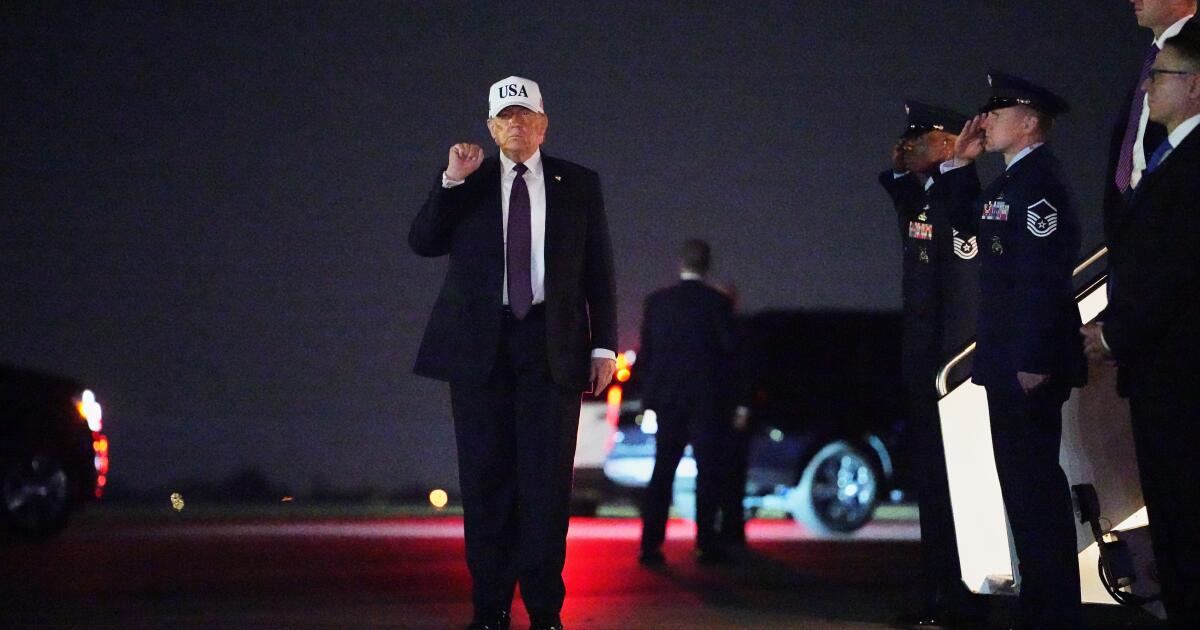
WASHINGTON — For a decade, President Trump promised to end what he calls forever wars, casting himself as a leader opposed to prolonged conflicts in the Middle East and who would rather pursue peace in the world.
Now, early in his second term, Trump is taking military action against Iran that could expand well beyond a limited effort to halt the country’s nuclear program.
In a video posted on Truth Social, the commander in chief said American forces also plan to “raze their missile industry to the ground” and “annihilate their navy.” He warned members of Iran’s military to surrender or “face certain death.” And urged the Iranian people to take the moment as an opportunity to rise up against their government.
“This regime will soon learn that no one should challenge the strength and might of the United States armed forces,” Trump said.
A few hours after relaying that message, Trump confirmed in a separate social media post that Ayatollah Ali Khamenei, the supreme leader of Iran, was among those killed by U.S. and Israeli strikes. Even with his death, Trump said that “the heavy and pinpoint bombing” would continue in Iran “as long as necessary to achieve our objective of PEACE THROUGHOUT THE MIDDLE EAST AND, INDEED, THE WORLD!”
Trump, who has been considering a strike on Iran for several weeks, acknowledged he reached the decision to attack Iran while aware of the human toll that could come with it.
“The lives of courageous American heroes may be lost, and we may have casualties. That often happens in war,” he said. “But we are doing this, not for now, we are doing this for the future, and it is a noble mission.”
Trump’s military campaign in Iran is a sharp turn in tone for a president who has long been critical of open-ended conflicts in the Middle East, and marks a shift from an America-first agenda message that helped him return to the White House.
“I’m not going to start a war. I’m going to stop wars,” Trump said in his November 2024 victory speech as he promised to focus national resources on domestic priorities rather than foreign conflicts.
As Trump advocated to bring home American forces from deployments around the world and to withdraw from key defense treaties, his position resonated with a war-weary electorate in the lead-up to the election.
Fewer than six in 10 Americans (56%) believed the United States should take an active role in world affairs ahead of the election — the second-lowest level recorded since the question was first asked in 1974, according to polling by the Council on Foreign Affairs.
Trump’s posture on war in the Middle East had been largely consistent before he ran for office.
In 2013, he criticized then-President Obama’s negotiations with Tehran, predicting in a post on Twitter that Obama would “attack Iran because of his inability to negotiate properly.” That same year, Trump warned that “our horrendous leadership could unknowingly lead us into World War III.”
And in a heated February 2016 debate, Trump attacked former Florida Gov. Jeb Bush, stating that his brother George W. Bush lied about Iraq’s nuclear capabilities to get the U.S. into the Iraq war. Trump called the Iraq war a “big, fat mistake” that “destabilized the Middle East.”
“They lied. They said there were weapons of mass destruction. There were none, and they knew there were none,” he said.
At the time of the Iraq war, however, Trump had said he supported it.
Trump’s confrontation with Iran bears little resemblance to his earlier rebukes.
Trump has yet to present evidence of an imminent threat to the United States from Iran’s nuclear program — a capability he claimed to have “obliterated” just eight months ago — and has instead framed the military campaign as one to ensure Tehran never develops nuclear weapons at all.
“It is a very simple message,” he said. “They will never have a nuclear weapon.”
Trump’s shift has already drawn the attention of congressional Democrats, many of whom are calling the president out for backing out on his promise to end foreign wars — and are demanding that he involve Congress in any further military actions.
“Regardless of what the President may think or say, he does not enjoy a blank check to launch large-scale military operations without a clear strategy, without any transparency or public debate, and not without Congressional approval,” Sen. Alex Padilla (D-Calif.) said.
Sen. Adam Schiff (D-Calif.) criticized Trump for “drawing the country into yet another foreign war that Americans don’t want and Congress has not authorized.”
The military involvement in Iran is not the first time that members of Congress have complained about the Trump administration’s willingness to sideline the legislative branch on decisions that could trigger broader conflicts this year.
In January, Trump ordered military forces to capture former Venezuelan President Nicolás Maduro and said the United States would run the sovereign nation until further notice. He threatened military action in Colombia, whose leftist President Gustavo Petro has been one of Trump’s most vocal critics.
Trump has alienated allied nations when he said he was willing to send American troops to seize Greenland, a semiautonomous territory of Denmark. And on Friday, he said U.S. is in talks with Havana and raised the possibility of a “friendly takeover of Cuba” without offering any details on what he meant.
His actions have coincided with his annoyance at not being awarded the Nobel Peace Prize. At one point, the president said he no longer felt an “obligation to think purely of Peace” because he didn’t get the recognition.
Trump’s shifting tone, and his use of violent war imagery in his pretaped remarks about Iran, have rattled even part of his base.
“I did not campaign for this. I did not donate money for this,” said former Rep. Marjorie Taylor Greene, a conservative who recently left Congress after a bitter fight with Trump. “This is not what we thought MAGA was supposed to be. Shame!”
Republican leaders, however, are largely standing behind the president.
Senate Majority Leader John Thune (R-S.D.) said Iran “posed a clear and unacceptable threat” to the United States and has refused “the diplomatic off-ramps.” House Speaker Mike Johnson (D-La.) said Trump took the action after exhausting “every effort to pursue peaceful and diplomatic solutions.”
Other top Republican lawmakers rallied behind Trump, too.
“The butcher’s bill has finally come due for the ayatollahs,” Sen. Tom Cotton, the chairman of the Senate Intelligence Committee, wrote in a post on X. “May God bless and protect our troops on this vital mission of vengeance, and justice, and safety.”
Politics
Iran fires missiles at US bases across Middle East after American strikes on nuclear, IRGC sites

NEWYou can now listen to Fox News articles!
Iran launched missile and drone strikes targeting U.S. military facilities in multiple Middle Eastern countries Friday, retaliating after coordinated U.S.–Israeli strikes on Iranian military and nuclear-linked sites.
Explosions were reported in or near areas hosting American forces in Bahrain, Qatar, the United Arab Emirates, Kuwait and Jordan, according to regional officials and state media accounts. Several of those governments said their air defense systems intercepted incoming projectiles.
It remains unclear whether any U.S. service members were killed or injured, and the extent of potential damage to American facilities has not yet been confirmed. U.S. officials have not publicly released casualty figures or formal damage assessments.
Iran’s Islamic Revolutionary Guard Corps (IRGC) described the operation as a direct response to what Tehran called “aggression” against Iranian territory earlier in the day. Iranian officials claimed they targeted U.S. military infrastructure and command facilities.
Explosions were reported in or near areas hosting American forces in Bahrain, pictured above. (Photo by Petty Officer 2nd Class Adelola Tinubu/U.S. Naval Forces Central Command/U.S. 5th Fleet )
The United States military earlier carried out strikes against what officials described as high-value Iranian targets, including IRGC facilities, naval assets and underground sites believed to be associated with Iran’s nuclear program. One U.S. official told Fox News that American forces had “suppressed” Iranian air defenses in the initial wave of strikes.
Tomahawk cruise missiles were used in the opening phase of the U.S. operation, according to a U.S. official. The campaign was described as a multi-geographic operation designed to overwhelm Iran’s defensive capabilities and could continue for multiple days. Officials also indicated the U.S. employed one-way attack drones in combat for the first time.
IF KHAMENEI FALLS, WHO TAKES IRAN? STRIKES WILL EXPOSE POWER VACUUM — AND THE IRGC’S GRIP
Smoke rises after reported Iranian missile attacks, following strikes by the United States and Israel against Iran, in Manama, Bahrain, Feb. 28, 2026. (Reuters)
Iran’s retaliatory barrage targeted countries that host American forces, including Bahrain — home to the U.S. Navy’s Fifth Fleet — as well as Qatar’s Al Udeid Air Base and the UAE’s Al Dhafra Air Base. Authorities in those nations reported intercepting many of the incoming missiles. At least one civilian was killed in the UAE by falling debris, according to local authorities.
Iranian officials characterized their response as proportionate and warned of additional action if strikes continue. A senior U.S. official described the Iranian retaliation as “ineffective,” though independent assessments of the overall impact are still developing.
Smoke rises over the city after the Israeli army launched a second wave of airstrikes on Iran in Tehran on Feb. 28, 2026. (Fatemeh Bahrami/Anadolu via Getty Images)
CLICK HERE TO DOWNLOAD THE FOX NEWS APP
Regional governments condemned the strikes on their territory as violations of sovereignty, raising the risk that additional countries could become directly involved if escalation continues.
The situation remains fluid, with military and diplomatic channels active across the region. Pentagon officials are expected to provide further updates as damage assessments and casualty reviews are completed.
Fox News’ Jennifer Griffin contributed to this report.
-

 World3 days ago
World3 days agoExclusive: DeepSeek withholds latest AI model from US chipmakers including Nvidia, sources say
-

 Massachusetts4 days ago
Massachusetts4 days agoMother and daughter injured in Taunton house explosion
-

 Montana1 week ago
Montana1 week ago2026 MHSA Montana Wrestling State Championship Brackets And Results – FloWrestling
-

 Denver, CO4 days ago
Denver, CO4 days ago10 acres charred, 5 injured in Thornton grass fire, evacuation orders lifted
-

 Louisiana6 days ago
Louisiana6 days agoWildfire near Gum Swamp Road in Livingston Parish now under control; more than 200 acres burned
-

 Technology1 week ago
Technology1 week agoYouTube TV billing scam emails are hitting inboxes
-

 Technology1 week ago
Technology1 week agoStellantis is in a crisis of its own making
-

 Politics1 week ago
Politics1 week agoOpenAI didn’t contact police despite employees flagging mass shooter’s concerning chatbot interactions: REPORT







